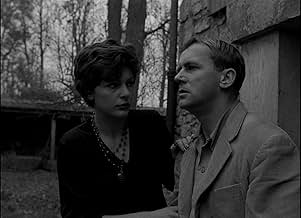Anne Goupil conoce por casualidad a un grupo de individuos convencidos de la existencia de una especie de conspiración mundial. Poco después, Juan el guitarrista, uno de ellos, muere misteri... Leer todoAnne Goupil conoce por casualidad a un grupo de individuos convencidos de la existencia de una especie de conspiración mundial. Poco después, Juan el guitarrista, uno de ellos, muere misteriosamente.Anne Goupil conoce por casualidad a un grupo de individuos convencidos de la existencia de una especie de conspiración mundial. Poco después, Juan el guitarrista, uno de ellos, muere misteriosamente.
- Premios
- 1 premio ganado y 1 nominación en total
- Ida
- (as Louise Roblin)
- Dirección
- Guionistas
- Todo el elenco y el equipo
- Producción, taquilla y más en IMDbPro
Argumento
¿Sabías que…?
- TriviaAs an inside joke, in Los 400 golpes (1959) the film Antoine Doinel and his parents go to see is "Paris Belongs to Us", which wouldn't be released for another two years.
- ErroresNear the end, when Pierre is on a public phone at Dupleix, a poster near him reads "DIMANCHE 31 MAI" (Sunday 31 May), advertising a meeting of the Parti Socialiste Unifié. May 31st was a Sunday in 1959, and this scene was filmed in late 1958. However, the film is supposed to be taking place in June 1957, so it makes no sense that a meeting is being advertised nearly 2 years in advance.
- Citas
Anne Goupil: [reading aloud from Shakespeare's The Tempest] Full fathom five thy father lies / Of his bones are coral made / Those are pearls that were his eyes / Nothing of him that doth fade / But doth suffer a sea-change / Into something rich and strange
- Créditos curiosos"Paris belongs to nobody." PEGUY
- ConexionesFeatured in Cinéma, de notre temps: Jacques Rivette le veilleur: 1-Le jour (1990)
So we have a film-within, as often with Nouvelle Vague, but also a film without. Or better yet, the film we are watching as devised by unseen minds above shaping its world. Bridged by actors (and non-actors) who act parts knowingly or unknowingly, who may be chess pawns moved in turn by other pawns. The idea is that eventually we never get to find out how much of what we saw was this game and whether or not the game was imagined or masking a sinister plot.
So far so good, a complex film in which to superimpose the various grids. Yet at the same time not so complex after all, rather obvious in how it handles us the various keys.
For example; describing the play he's staging, the director says that he welcomes the challenge of bringing order to the convoluted mesh of different roles, that the world of the play is chaotic but not absurd. Does anyone have doubts that we're watching a surrogate Rivette describe the film? Then the stuff about conspiracies. The idea is of course that they may or may not be true, yet in getting there we are treated with naive politics about money ruling the world, a policed, monitored world.
In the finale we get some rather interesting insinuations about where the mind conspiring for answers in the face of an uncertain world leads us. When anything is imagined to be possibly true, nothing is.
The one notion that holds some actual power in all this, is precisely the one that is not explicit. A film noir plot elusively unraveling in the background of so much distraction, about a mistress and her ex-lover arranging murders as suicides. Why, to what end, again open ends. We may or may not imagine this, but this ambiguity is ours.
We would later find in the films of David Lynch and Raoul Ruiz all this situated back in the imaginative mind, where all our fanciful storytelling begins and where the illusionary images (bent by desire) we use to represent reality are born. In more cinematic ways, more fluid. This maintains the appearance of an ordinary world, it's talky, and the camera is not adventurous. It's never really dangerous, except until too late, or passionately engaged in its codas.
But one of the places this mode begins is here, in nascent form. Earlier yet, it was film noir, which the film references and even innovates in an important way, ingenious for its time (by making the noir plot the vague inference, and the karmic forces of noir the explicit reference and actively recognized by the characters). Although it often appeared clearcut and about a simple crime, it was riskier stuff in the right hands.
(A few more words on this: with noir we view a threatening cityscape where cast upon it are shadows of the mind, illusions of desire about a woman or money which in turn distort what is perceived of reality. With the post-noir landscapes (such as in Lynch), we experience instead the world of the mind - now the shadows are inverted, they're pieces of reality which seep back as filmic devices, which the mind arranges into a movie plot that sustains the illusion! This is for me one of the most fascinating journeys available in cinema, from Shangai to Inland Empire, and Rivette's film may not have refined as much but it's an important link in the transition.)
- chaos-rampant
- 26 jun 2011
- Enlace permanente
Selecciones populares
- How long is Paris Belongs to Us?Con tecnología de Alexa
Detalles
- Fecha de lanzamiento
- País de origen
- Idiomas
- También se conoce como
- Paris Belongs to Us
- Locaciones de filmación
- Pont des Arts, Paris 6, París, Francia(2 scenes on bridge)
- Productoras
- Ver más créditos de la compañía en IMDbPro
- Tiempo de ejecución2 horas 21 minutos
- Color
- Mezcla de sonido
Contribuir a esta página



































